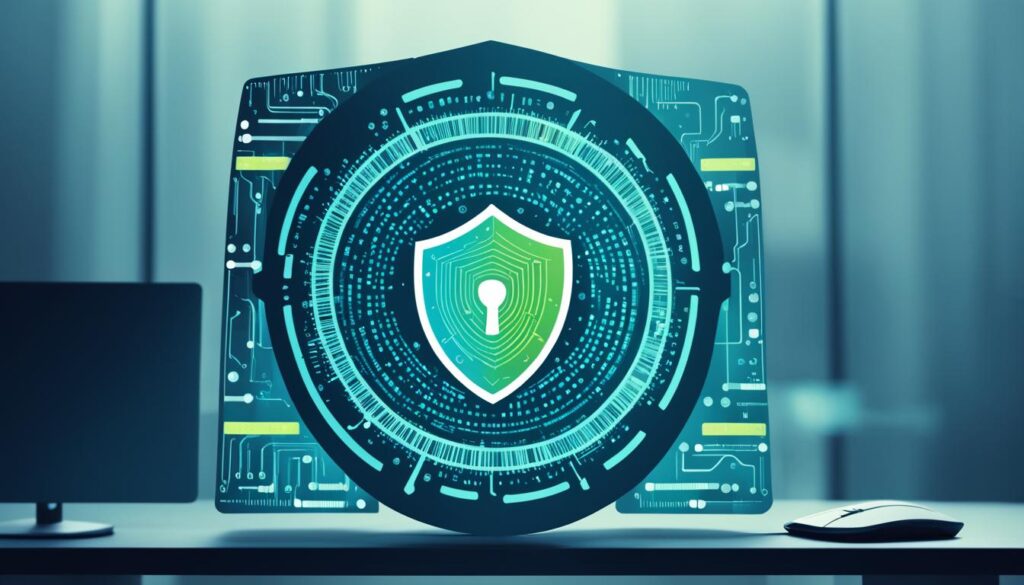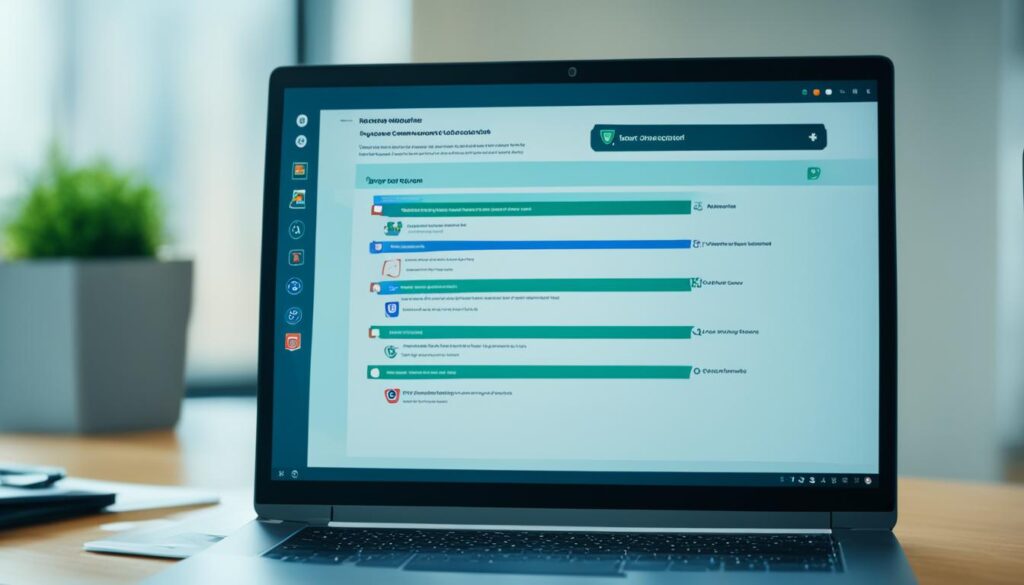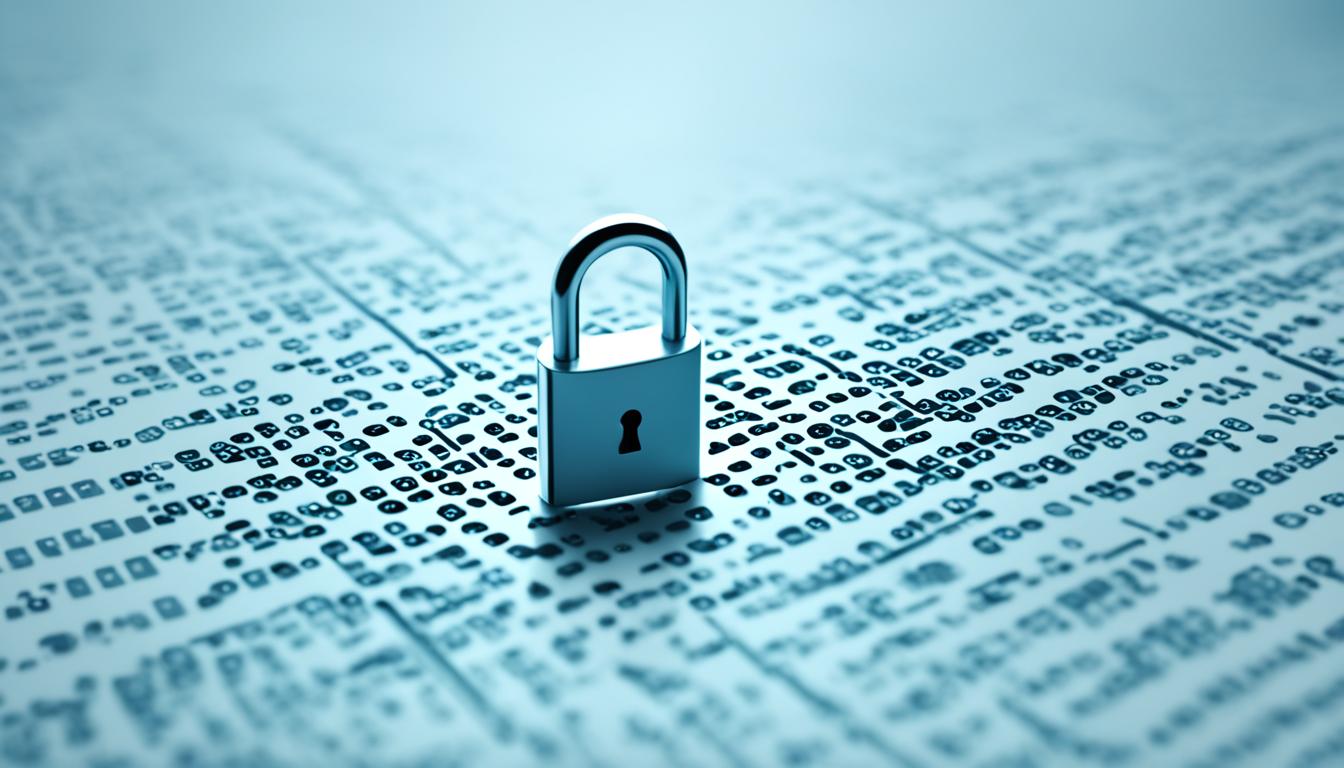Welcome to the digital era, where remote work has become the new norm. With the flexibility and convenience it offers, remote work has transformed the way we work. However, with this shift comes the need for enhanced cybersecurity measures to protect your data and devices.
As remote work continues to thrive, it’s essential to understand the risks involved and take proactive steps to ensure data protection and device security. This article will delve into the world of remote work cybersecurity and provide you with practical tips to keep your information safe.
Key Takeaways:
- Remote work cybersecurity is crucial in the digital era.
- Protecting your data and devices should be a top priority.
- Implementing robust security measures is essential to mitigate risks.
- Remote work security checklist can help safeguard sensitive information.
- Prioritizing remote work security builds trust and maintains productivity.
The Importance of Remote Work Security
Remote work has become the new norm for many organizations, offering flexibility and convenience. However, this shift comes with its own set of cybersecurity challenges. From accessing company networks through unsecured Wi-Fi connections to the potential for data breaches and increased vulnerability to cyberattacks, remote work poses significant risks to the security of sensitive information.
To protect your data and maintain business continuity, it is crucial to recognize the importance of remote work security. Implementing the right security measures can help safeguard your data, devices, and privacy while working remotely.
The Risks of Remote Work
Working remotely exposes individuals and organizations to various cybersecurity risks:
“Remote work can expose employees to risks, such as using unsecured public Wi-Fi networks that can be easily targeted by cybercriminals, leading to unauthorized access to sensitive information.” – John Smith, Cybersecurity Expert
Without the proper security measures in place, remote workers are vulnerable to data breaches, identity theft, and other malicious activities. Protecting your data and devices should be a top priority to ensure the confidentiality, integrity, and availability of valuable information.
Remote Work Security Measures
To mitigate the risks associated with remote work and maintain a secure work environment, consider implementing the following security measures:
- Use a Virtual Private Network (VPN) to encrypt your internet connection and secure your data when accessing company resources remotely.
- Enable multi-factor authentication (MFA) for all your accounts to add an extra layer of security against unauthorized access.
- Regularly update your devices with the latest security patches and firmware updates to protect against known vulnerabilities.
- Utilize strong and unique passwords for all your online accounts and consider using a password manager to securely store and manage them.
- Be cautious of phishing attacks and only click on links or download attachments from trusted sources.
- Securely store and backup your sensitive data, and ensure that it is encrypted both at rest and in transit.
By following these security measures, you can enhance the protection of your data and devices, reduce the risk of cyber threats, and safeguard your privacy while working remotely.
Secure Your Remote Work Environment
Creating a secure remote work environment goes beyond implementing technical measures. It also involves promoting a culture of security awareness within your organization:
- Educate employees about the importance of remote work security and provide training on identifying common cybersecurity threats.
- Establish clear policies and guidelines for remote work, including acceptable use of company resources and data protection protocols.
- Regularly communicate with remote workers to address their concerns and provide updates on the latest security practices.
- Conduct regular cybersecurity audits and vulnerability assessments to identify and address any potential weaknesses in your remote work infrastructure.
By taking a holistic approach to remote work security, you can create a secure work environment and ensure the confidentiality and integrity of your data.

| Common Remote Work Security Risks | Protective Measures |
|---|---|
| Using unsecured public Wi-Fi networks | Use a VPN to encrypt your internet connection |
| Falling victim to phishing attacks | Be cautious of suspicious links and download attachments from trusted sources only |
| Data breaches and unauthorized access | Implement strong passwords and multi-factor authentication (MFA) |
| Device theft or loss | Enable remote device tracking and wiping capabilities |
| Lack of proper data backup and encryption | Regularly backup and encrypt sensitive data |
The Consequences of Poor Remote Work Security
Poor remote work cybersecurity practices can have severe consequences, putting sensitive data and privacy at risk. By neglecting proper security measures, individuals and organizations expose themselves to various cybersecurity risks in the remote work landscape.
Data Breaches and Intellectual Property Theft
Data breaches are a significant concern when it comes to remote work. Without robust cybersecurity measures in place, remote workers become vulnerable to cyberattacks, leading to unauthorized access and theft of confidential information. Intellectual property theft, including proprietary software, trade secrets, and sensitive client data, can have devastating consequences for businesses and their competitive edge.
Financial Losses and Productivity Disruptions
The financial impact of poor remote work security cannot be overstated. Cyberattacks can result in substantial financial losses due to stolen funds, ransom payments, and legal expenses associated with addressing security breaches. Additionally, productivity disruptions caused by cyber incidents can lead to missed deadlines, decreased work efficiency, and potential revenue loss.
Reputational Damage
When remote work security is compromised, an organization’s reputation is on the line. News of a data breach or security incident can quickly spread, damaging customer trust and confidence in the company. Rebuilding a tarnished reputation can be an uphill battle, particularly in industries where data privacy and security are paramount.
Legal and Regulatory Consequences
Poor remote work security practices can have legal and regulatory implications. Organizations may face fines, penalties, and legal action for failing to protect sensitive data, as numerous laws and regulations govern data privacy and security. Compliance with industry-specific regulations, such as the General Data Protection Regulation (GDPR) or the Health Insurance Portability and Accountability Act (HIPAA), is essential for avoiding legal repercussions.
It is crucial for remote workers and organizations to prioritize cybersecurity to mitigate these potential consequences. By implementing robust remote work security measures and following best practices, individuals and businesses can protect sensitive data, ensure privacy, and avoid the significant risks associated with poor remote work security.
Remote Work Security Checklist
To ensure the protection of sensitive information and mitigate the risks of poor remote work security, it is crucial to follow a comprehensive remote work security checklist. By implementing the following best practices and cybersecurity measures, remote workers and organizations can enhance their security posture:
- Establish Secure Network Connections: Utilize Virtual Private Networks (VPNs) to encrypt internet connections and safeguard data transmitted between remote workers and company networks. This helps protect against unauthorized access and data intercepts.
- Implement Data Encryption and Backups: Encrypt sensitive files and data both during transit and at rest. Regularly back up critical data to secure storage locations, either on-premises or through trusted cloud service providers.
- Ensure Software and Device Security: Keep all software and devices up to date with the latest security patches and updates. Enable firewalls, anti-malware, and anti-virus software to prevent unauthorized access and detect and remove malicious threats.
- Provide Employee Education and Awareness: Conduct regular training sessions to educate remote workers about cybersecurity best practices. Empower them with knowledge on recognizing phishing attempts, practicing strong password hygiene, and safeguarding sensitive information.
“Implementing strong security measures is crucial in today’s remote work landscape. Safeguarding data and privacy requires a proactive approach, encompassing secure network connections, data encryption, software and device security, and employee education.”
By incorporating these remote work security measures into their daily practices, remote workers can enhance their cybersecurity defenses and minimize the risk of data breaches and other cyber threats.

Conclusion
In today’s digital era, the importance of remote work cybersecurity cannot be overstated. Ensuring the protection of your data and devices is crucial in safeguarding sensitive information and maintaining privacy while working remotely. By implementing the recommended remote work security measures discussed in this article, both remote workers and organizations can minimize the inherent risks associated with remote work.
Not only does prioritizing remote work security protect valuable data, but it also helps build trust and maintain productivity in remote work environments. By establishing secure network connections, implementing data encryption and backups, ensuring software and device security, and providing employee education on cybersecurity best practices, remote workers can create a secure and resilient remote work environment.
Protecting your data and devices in a remote work setting is more important than ever. By following recommended remote work security measures, such as utilizing strong passwords, regularly updating software, and being cautious when connecting to public Wi-Fi, you can significantly reduce the potential vulnerabilities and risks associated with remote work. Remember, remote work security is a shared responsibility between employees and organizations, and investing in cybersecurity measures is an investment in your future success and peace of mind.
FAQ
What are the key aspects of remote work security?
The key aspects of remote work security include protecting your data and devices, implementing secure network connections, ensuring device and software security, and providing employee education and awareness about cybersecurity best practices.
What are the potential consequences of poor remote work security?
Poor remote work security can lead to data breaches, intellectual property theft, financial losses, productivity disruptions, reputational damage, and legal and regulatory consequences.
What measures should I take to ensure remote work security?
To ensure remote work security, you should establish secure network connections, implement data encryption and backups, ensure software and device security, and educate employees about cybersecurity best practices.
How can I protect sensitive information while working remotely?
To protect sensitive information while working remotely, you can use secure network connections, encrypt your data, regularly back up your files, and adhere to cybersecurity best practices like using strong passwords and being cautious of phishing attempts.
What can organizations do to prioritize remote work security?
Organizations can prioritize remote work security by providing employees with the necessary tools and resources for secure remote work, implementing robust cybersecurity measures, conducting regular security audits, and fostering a culture of cybersecurity awareness and education.








